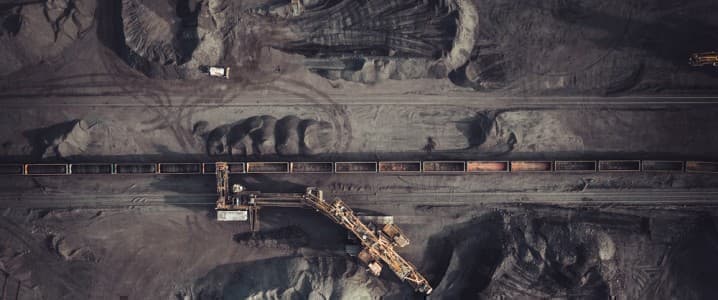Almost everyone – environmentalists, policymakers, financial institutions, and fossil fuel magnates alike – agree on one thing: it’s time to ditch coal. And that’s a list of people who don’t agree on pretty much anything at all. It’s clear that coal needs to go. The fossil fuel is infamously dirty and emits the highest amount of carbon dioxide of any commonly used fossil fuel. It’s the single biggest contributor to global warming. And it’s not even cheap anymore. As the renewable energy industry has continued to grow and advance, wind, hydro, and solar prices have now undercut coal prices in most of the world thanks to increased efficiency and economies of scale.
So why, if virtually everyone agrees on something energy-related for once, has the world been so soundly unable to move past coal? Not only has the global economy been unable to phase out coal, but consumption has also only increased in the past year and is shattering records across the world. In 2021, coal consumption rose a frightening 9% to reach a historic high of 10,350 terawatt-hours. Just last month, China’s daily coal output hit an all-time high.
There are a few reasons for coal’s latest renaissance. The continued economic fallout from the novel coronavirus pandemic has led to devastating supply chain disruption, volatile energy prices, and an extremely tight supply for oil and gas. Europe and Asia, in particular, have been experiencing a devastating energy crisis and sky-high prices are threatening consumers’ livelihoods. The situation was already dire when Russia invaded Ukraine, further disrupting the global energy market. Russia is the largest exporter of oil to global markets and is on track to be the fourth-largest gas exporter. Targeting these exports with sanctions is one of the best options to truly hit the Kremlin where it hurts in order to condemn and hopefully control the ongoing Russian war in Ukraine, but will make an already tight energy market even more punishing during a time of runaway inflation. Desperation for a relatively affordable, readily available, and reliable supply of energy has become priority number one for many countries. And for many, coal has been the answer.
Related: U.S. Natural Gas Prices To Spike As Exports Boom
It’s not just national governments that have been unable to wean themselves off of coal in this context. International banks and financial institutions, too, continue to fall far short of their pledges to defund the coal industry. In the last three years alone, commercial banks have poured a whopping $1.5 trillion into the industry according to a recent bombshell report by eco-groups Urgewald and Reclaim Finance and a laundry list alliance of non-governmental organizations. According to the report, just four banks are responsible for the bulk of this coal funding: Japan's Mizuho Financial Group, Barclays, Citi, and JPMorgan Chase. The kicker? All four of these firms are members of the UN Net Zero Banking Alliance. This means that these banks have pledged to convert their portfolios to net-zero holdings by 2050, but have made little to no progress toward that goal.
Institutional investors are not doing any better than the banks. This group’s coal holdings have not decreased in any significant way in the past couple of years, and they have a long way to go by mid-century. The report shows that BlackRock tops the list of coal-holding institutional investors with 9% of global coal stock holdings. BlackRock alone has $35 billion invested in the construction of new coal plants. “BlackRock's holdings represent a small percentage of its $10 trillion in total assets under management, but the coal developers in BlackRock's portfolio have plans for new projects equivalent to the power capacity of all the coal in Russia, Japan, Indonesia, Poland, and Germany combined,” reports CNN Business.
The world’s inability to quit coal is indicative of just how difficult it will be to redirect the global economy swiftly and sweepingly enough to come anywhere close to meeting the goals set by the Paris agreement. We all know what needs to be done, and where the finish line is set, but getting there will require an unprecedented level of global cooperation, and no small amount of hiccups and economic fallout along the way. Quitting coal isn’t going to be easy or pretty – especially not now, with consumers already feeling the pain – but continuing to fund coal is by far the greater of two evils.
By Haley Zaremba for Oilprice.com
More Top Reads From Oilprice.com:
- Mid-Cap Energy Stocks Are Outperforming Supermajors
- The Odds Of A Nuclear Deal With Iran Are Shrinking Every Day
- U.S. Exports Oil From SPR Release: Report



















The primary reason for coal's renaissance is radical under-investment in other RELIABLE sources of energy, such as oil and gas. Wind, solar, energy storage are all worthwhile investments, if you don't mind negative ROI or the govt subsidizes your investment (i.e. the user/taxpayer pays through the nose - Europe comes to mind!) So instead of somewhat dirty energy in transition to somewhat clean energy, we get filthy energy, with not only large amounts of CO2, but far worse volumes of real pollution.
I say save the coal for what it is best suited, as an incredible long term agricultural soil additive. [Why do we have a fertilizer crisis in agriculture? Because we only fertilize for the current crop, not for the crops of our children or grandchildren.]